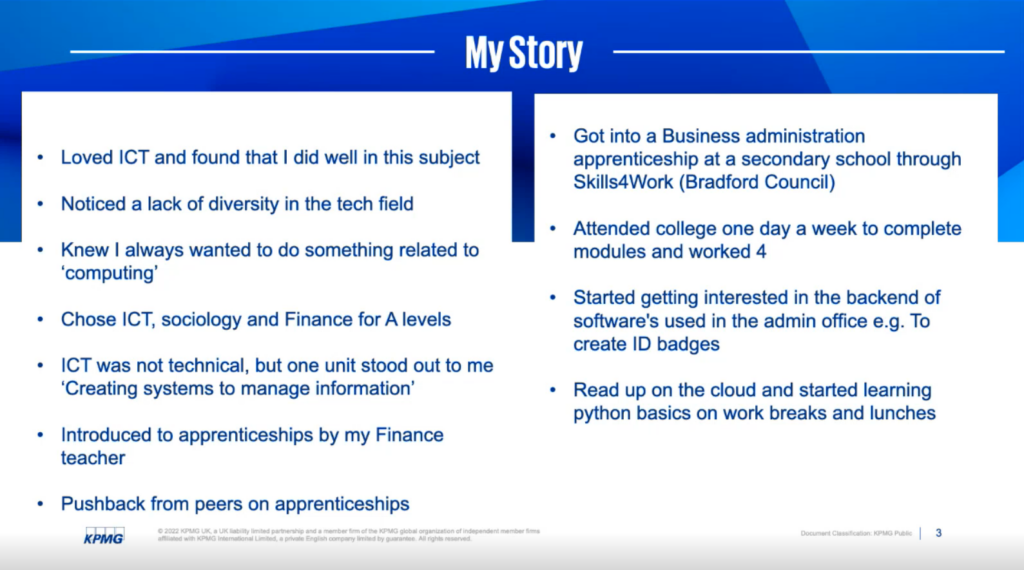The Apprenticeship & Careers Insight Event, hosted by York St John University Degree Apprenticeships team, in collaboration with the QED Foundation, recently convened with a focus on exploring the socio-economic impacts of apprenticeships in culturally diverse and deprived areas, such as the city of Bradford. This event featured a range of speakers who passionately advocated for apprenticeships as a means of fostering economic regeneration, improving social mobility, and nurturing talent within the community.
Recording is valid until 10th August 2024, contact apprenticeships@yorksj.ac.uk for access after this point.
Tom Burton’s Introduction: Setting the Stage

Tom Burton’s opening remarks set a dynamic tone for the event, emphasising the importance of readiness and technical preparedness among participants. He highlighted the event’s structure, which included distinguished speakers from York St John University, QED Foundation, Bradford Council, and industry leaders. Tom underscored the relevance of the event amidst shifting political priorities, framing apprenticeships as crucial in adapting to future economic landscapes.
Key themes outlined by Tom included understanding the structure and benefits of apprenticeships, their socio-economic impacts, and practical guidance for prospective apprentices. His introduction primed participants for engaging discussions on apprenticeships’ role in shaping a skilled and adaptable workforce aligned with current market demands.
Professor Adeeba Malik’s Vision: Empowering through Education
Professor Adeeba Malik CBE of the QED Foundation provided profound insights into the foundation’s mission to bridge economic and social disparities through education and skills development. Founded in 1990, QED focuses on enhancing skills through language development, CV preparation, and interview training, crucial for connecting individuals with employment opportunities in Bradford and beyond.
Professor Adeeba highlighted QED’s collaboration with York St John University, emphasising initiatives like the Yorkshire Asian Young Achievers Awards and mentoring programmes aimed at preparing Bradford youth for educational and career success. She underscored the pivotal role of apprenticeships in providing a practical pathway for young people to earn while they learn, mitigating the financial burden associated with traditional higher education.
Her advocacy for increased government investment in skills development resonated with the audience, stressing the need for informed decision-making among young people and their families regarding apprenticeships. Professor Adeeba’s vision for Bradford included leveraging apprenticeships in creative industries, digital technology, IT, and finance to drive local economic growth and empower youth.

Robert Herriot’s Practical Insights: Navigating Apprenticeships

Robert Herriot, an apprenticeship consultant, provided detailed insights into the diverse landscape of apprenticeship opportunities available across various sectors. He outlined the structured lifecycle of apprenticeships, from induction and on-the-job training to endpoint assessments, underscoring their role in combining academic learning with practical experience.
Highlighting degree apprenticeships offered by York St John University, Robert showcased programmes like Chartered Manager, Data Science and Project Manager, designed to equip apprentices with industry-relevant skills and qualifications. His practical advice on application processes and interview techniques empowered prospective apprentices to navigate the complexities of securing apprenticeship positions effectively.
Robert’s presentation illuminated apprenticeships as a structured pathway for professional growth and development, catering to diverse career aspirations and industry demands. His insights resonated with the event’s focus on promoting apprenticeships as a viable alternative to traditional university routes.
Peter Williams’ Community Impact: Skills Development and Local Empowerment
Peter Williams from Bradford Council’s Skills for Work highlighted the council’s commitment to enhancing skills and employment opportunities through apprenticeships. He shared his personal journey from apprentice to senior officer, emphasising the transformative impact of apprenticeships on individuals and communities in Bradford.

Skills for Work offers a range of apprenticeships, from leadership and management to business administration and customer service, catering to adult learners aged 19 and above. Peter’s advocacy for apprenticeships as a catalyst for local economic growth and social mobility underscored their significance in empowering Bradford’s youth and diversifying the local workforce.
His advice to prospective apprentices included thorough research on apprenticeship standards and engaging with employers and former apprentices to explore career pathways effectively. Peter’s presentation highlighted apprenticeships as a strategic investment in building a skilled and resilient workforce capable of driving Bradford’s future prosperity.
John McMahon’s Cultural Vision: Bradford 2025 and Apprenticeship Opportunities
John McMahon, Director of Skills, Volunteering, and Wellbeing at Bradford 2025, outlined the cultural and economic impact of the upcoming UK City of Culture initiative on Bradford. He emphasised the initiative’s potential to create over 7,000 new jobs, attract millions of visitors, and generate significant economic returns for the region.

Bradford 2025’s commitment to apprenticeships includes initiatives like Young Creatives and volunteering opportunities, offering training placements and valuable experience in event management and customer service. John highlighted apprenticeships as integral to Bradford’s long-term cultural legacy and community engagement strategy, advocating for increased apprenticeship opportunities across various sectors.
His vision for Bradford encompassed nurturing local talent, fostering creativity, and enhancing cultural participation through apprenticeships, aligning with broader efforts to position Bradford as a hub of cultural and economic vitality.
Industry Perspectives: Howdens and Morrisons


Alwyn emphasised Howdens’ local recruitment efforts and apprenticeship opportunities in kitchen design and supply chain management, underscoring their role in meeting industry demands and supporting local communities.
Malachi shared his journey as a finance apprentice at Morrisons, detailing the structure and benefits of Morrisons’ degree apprenticeships in retail, manufacturing, corporate roles, and finance. His insights into the application process and career progression highlighted apprenticeships as a gateway to professional growth and development within a leading UK business.


Maira Usmani’s Technological Journey: Empowering Through Innovation

Maira Usmani, a DevOps engineer apprentice at KPMG, offered a firsthand account of her journey into the technology sector through a degree apprenticeship. She highlighted the practical benefits of apprenticeships in gaining real-world experience while pursuing academic qualifications, emphasising the role of apprenticeships in promoting gender diversity and inclusivity within STEM fields.

Maira’s story underscored the transformative impact of apprenticeships in equipping young people with technical skills and industry-relevant experience, essential for thriving in competitive global markets.
Conclusion: Promoting Apprenticeships for Sustainable Growth
The Apprenticeship & Careers Insight Event, in partnership with the QED Foundation, showcased apprenticeships as a transformative pathway for individuals and communities in culturally diverse and deprived areas like Bradford. Speakers from diverse backgrounds and industries articulated the value of apprenticeships in fostering economic regeneration, improving social mobility, and nurturing talent within local communities.
The event underscored the need for collaborative efforts between educational institutions, employers, and community organisations to promote apprenticeships effectively. By highlighting success stories, industry insights, and practical guidance, the event inspired attendees to consider apprenticeships as a viable and advantageous career pathway aligned with current market demands and future opportunities.
As we look ahead, promoting apprenticeships in culturally diverse and deprived areas will remain crucial in bridging skills gaps, promoting economic mobility, and building a resilient workforce capable of driving sustainable growth and innovation.

